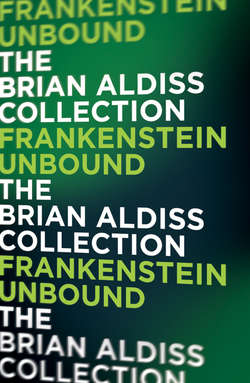Читать книгу Frankenstein Unbound - Brian Aldiss - Страница 9
2
ОглавлениеThe Times First Leader, August 20th, 2020:
DEADLY RELATIONSHIPS
Western scientists are now in general although not entire accord – for even in the domain of science opinion is rarely unanimous – that mankind is confronted with the gravest crisis of its existence, a crisis not to survive which is not to survive at all.
Crises which in prospect appear uniquely ominous have a habit of assuming family resemblances in retrospect. We observe that they were critical but not conclusive. To say this is not to be facetious. Professor James Ransome’s comment in San Francisco yesterday brought a sense of proportion to the increasingly alarmist news of the instability of the infrastructure of space – a sense of proportion particularly welcome to that large general public unaware until a fortnight ago that there was such a thing as an infrastructure of space, let alone that nuclear activity might have rendered it unstable. The professor’s remark that the present instability represents, in his words, ‘the great grey ultimate in pollution’ should remind us that the world has survived serious pollution scares for over fifty years.
However, there are sound reasons for regarding our present crisis as nothing less than unique. All three opposed sides in the war, Western, South American and Third World Powers, have been using nuclear weapons of increasing calibre within the orbits of the Earth-Luna system. Nobody has gained anything, unless one includes the doubtful benefit of having destroyed the civilian Moon colonies, but the general feeling has been one of relief that these weapons were used above rather than below the stratosphere.
Such relief, we now see, was premature. We are learning yet another bitter lesson on the indivisibility of Nature. We have long understood that sea and land formed an interrelated unit. Now – far too late, according to Professor Ransome and his associates – we perceive a hitherto undiscerned relationship between our planet and the infrastructure of space which surrounds and supports it. The infrastructure has been destroyed, or at least damaged, to the point at which it malfunctions unpredictably, and we are now faced with the consequences. Both time and space have gone ‘on the blink’, as the saying has it. We can no longer rely even on the sane sequence of temporal progression; tomorrow may prove to be last week, or last century, or the Age of the Pharaohs. The Intellect has made our planet unsafe for intellect. We are suffering from the curse that was Baron Frankenstein’s in Mary Shelley’s novel: by seeking to control too much, we have lost control of ourselves.
Before we go down in madness, the most terrible war in history, largely an irrational war of varying skin-tones, must be brought to an immediate halt. If the plateau of civilization, on to which mankind climbed with such long exertion, now has to be evacuated, let us at least head away into the darkness in good order. We should be able to perceive at last (and that phase ‘at last’ now contains grim overtones) that, as the relationship between space, planets, and time is more intimate and intricate than we had carelessly imagined, so too may be the relationship between black, white, yellow, red, and all the fleshtones in between.
